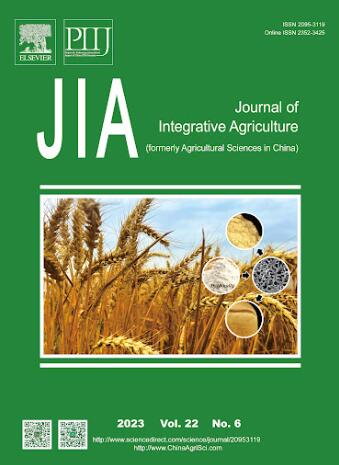1-Methylcyclopropene 对 20°C 贮藏期间'玉露香'梨表皮油腻感和品质的影响1
IF 4.4
1区 农林科学
Q1 AGRICULTURE, MULTIDISCIPLINARY
引用次数: 0
摘要
在 20°C 的贮藏期间,特定的梨栽培品种可能会出现油腻感,并因果实衰老而导致品质下降。在这些品种中,'玉露香'特别容易出现果皮油腻现象,造成重大经济损失。因此,迫切需要一种能有效抑制油腻发生的防腐剂。以往的研究表明,1-甲基环丙烯(1-MCP)在延长水果贮藏期方面具有功效。我们推测它也可能影响'玉露香'梨采后果皮油腻的发生。在这项研究中,我们用 1-MCP 处理了'玉露香'梨。我们在 20°C 下贮藏梨子,同时分析表面蜡的成分和形态,记录与蜡合成有关的酶活性,并测量与果实贮藏质量和生理特征有关的指标。结果表明,在 20°C 下长期贮藏会导致果皮油腻度迅速增加,这与观察到的 L*、油腻度评分以及总蜡和油脂蜡成分含量的增加是一致的。此外,有迹象表明角质蜡发生了融化,形成了无定形结构。与对照组相比,施用 1-MCP 能显著抑制 L* 值和油脂评分的增加,同时还能降低油蜡在货架期大部分阶段的累积率,此外还能延缓片状蜡结构向无定形结构的转变。在贮藏的最初七天,参与油脂蜡成分生物合成和新陈代谢的几种酶,包括脂氧合酶 (LOX)、磷脂酶 D (PLD) 和 β-酮酰-CoA 合酶 (KCS) 的活性先上升后下降。1-MCP 显著抑制了货架期早期(0-7 天)的 LOX 活性和货架期中后期(14-21 天)的 KCS 活性。此外,1-MCP 在抑制维生素 C 降解和重量损失的同时,还有效地保持了坚硬度、总可溶性固体(TSS)和可滴定酸(TA)含量、过氧化物酶(POD)和苯丙氨酸氨解酶(PAL)的活性。此外,它还抑制了多酚氧化酶(PPO)的活性、乙烯的产生和呼吸速率的增加。这些研究结果表明,1-MCP 不仅能延缓果皮油腻感的出现,还能在 20°C 温度下保持'玉露香'梨的整体贮藏品质。这项研究为开发抑制梨果皮油腻的新型防腐剂提供了一种新方法,并为进一步研究梨果的防腐问题提供了理论基础。本文章由计算机程序翻译,如有差异,请以英文原文为准。
Effects of 1-Methylcyclopropene on skin greasiness and quality of ‘Yuluxiang’ pear during storage at 20°C1
During storage at 20°C, specific pear cultivars may exhibit a greasy texture and decline in quality due to fruit senescence. Among these varieties, ‘Yuluxaing’ is particularly susceptible to peel greasiness, resulting in significant economic losses. Therefore, there is an urgent need for a preservative that can effectively inhibit the development of greasiness. Previous studies have demonstrated the efficacy of 1-methylcyclopropene (1-MCP) in extending the storage period of fruits. We hypothesize that it may also influence the occurrence of postharvest peel greasiness in the ‘Yuluxiang’ pears. In this study, we treated ‘Yuluxiang’ pears with 1-MCP. We stored them at 20°C while analyzing the composition and morphology of the surface waxes, recording enzyme activities related to wax synthesis, as well as measuring indicators associated with fruit storage quality and physiological characteristics. The results demonstrate that prolonged storage at 20°C leads to a rapid increase in skin greasiness, consistent with the observed elevations in L*, greasiness score, and the content of total wax and greasy wax components. Moreover, there were indications that cuticular waxes underwent melting, resulting in the formation of an amorphous structure. In comparison to controls, the application of 1-MCP significantly inhibited increments in L* values as well as grease scores while also reducing accumulation rates for oily waxes throughout most stages over its shelf period, additionally delaying transitions from flaky-wax structures towards their amorphous counterparts. During the initial seven days of storage, several enzymes involved in the biosynthesis and metabolism of greasy wax components, including lipoxygenase (LOX), phospholipase D (PLD), and β-ketoacyl-CoA synthase (KCS), exhibited an increase followed by a subsequent decline. The activity of LOX during early shelf life (0-7 d) and the KCS activity during middle to late shelf life (14-21 d) were significantly suppressed by 1-MCP. Additionally, 1-MCP effectively maintained firmness, total soluble solid (TSS) and titratable acid (TA) contents, peroxidase (POD), and phenylalanine ammonia-lyase (PAL) activities while inhibiting vitamin C degradation and weight loss. Furthermore, it restrained polyphenol oxidase (PPO) activity, ethylene production, and respiration rate increase. These findings demonstrate that 1-MCP not only delays the onset of peel greasiness but also preserves the overall storage quality of ‘Yuluxiang’ pear at a temperature of 20°C. This study presents a novel approach for developing new preservatives to inhibit pear fruit peel greasiness and provides a theoretical foundation for further research on pear fruit preservation.
求助全文
通过发布文献求助,成功后即可免费获取论文全文。
去求助
来源期刊

Journal of Integrative Agriculture
AGRICULTURE, MULTIDISCIPLINARY-
CiteScore
7.90
自引率
4.20%
发文量
4817
审稿时长
3-6 weeks
期刊介绍:
Journal of Integrative Agriculture publishes manuscripts in the categories of Commentary, Review, Research Article, Letter and Short Communication, focusing on the core subjects: Crop Genetics & Breeding, Germplasm Resources, Physiology, Biochemistry, Cultivation, Tillage, Plant Protection, Animal Science, Veterinary Science, Soil and Fertilization, Irrigation, Plant Nutrition, Agro-Environment & Ecology, Bio-material and Bio-energy, Food Science, Agricultural Economics and Management, Agricultural Information Science.
 求助内容:
求助内容: 应助结果提醒方式:
应助结果提醒方式:


